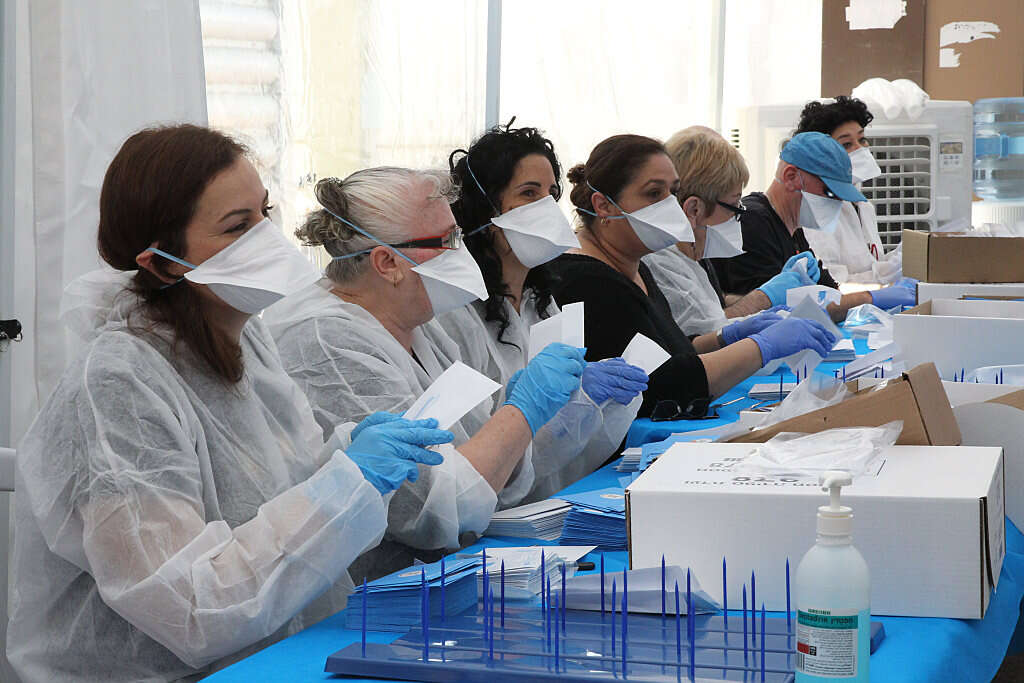by Gideon Allon
Central Elections Committee Head Orly Adas has several tricks up her sleeve to ensure the coronavirus pandemic does not undermine the integrity of the March 23 elections.
Central Elections Committee Head Attorney Orly Adas has one thing on her mind these days: making sure the coronavirus pandemic does not undermine the integrity of the March 23 elections.
The vote in just over two months will see Israelis go to the polls for the fourth time in two years. This time, however, voting is exponentially more complex. The March 4, 2020 elections took place mere days before the global pandemic hit Israel with full force – at the time only 13 people had been infected with COVID-19 and some 4,500 were under quarantine – and the outbreak, currently in its third resurgence, means Adas and her colleagues on the committee have to think out of the box.
In a recent press briefing Adas, who joined the Central Election Committee in 1998, introduced a series of measures seeking to enable a safe election, including drive-through voting, increasing the number of polling stations by 30% to reduce crowds, placing two voting booths in every station to speed up the process; and designating workers to ensure adherence to health guidelines – especially social distancing – at all sites.

"I would be lying if I told you I don't have my reservations," she told Israel Hayom. "I'll be honest with you, my stomach is turning. This is a very complex election campaign. We have to oversee a regular election day, with 11 polling stations, while simultaneously overseeing several others.
"The situation requires us to set up massive systems from scratch, like polling stations designated for COVID-19 patients and people who are in quarantine, [polling] stations in nursing homes and in assisted living centers, and dealing with a 30% increase in the number of polling places."
Still, Adas is convinced that she and her team "can meet any mission with which we are tasked."
Q: There are concerns that the volume of voters in polling stations could cause a spike in morbidity.
"One of our biggest challenges is to make sure that two weeks after the elections we don't see that. We plan to take every precaution necessary to make sure that doesn't happen.
"We all want to get our lives back after the elections. If we go our part and the public does its part, there is no reason to see morbidity rise."
According to Adas, the Central Election Committee is sparing no effort to meet every possible scenario that could arise on election day to minimize the pandemic's effect on the voting process.
"We try to find a solution to every situation. For example, each polling place will have an attendant tasked with enforcing social distancing. Every station with a large hall will have two ballot boxes, to allow for faster entry and exit; voters will be required to disinfect their hands with alcogel; a screen will separate the members of the polling committee and voters; and of course, everyone – members of the polling stations and the voters will be required to wear face masks."
The committee, she added, "plans to devote a lot of time and effort to producing TV ads to inform the public of things [voter arrangements] in the run-up to the election, in which we will try to instill in the public a sense of safety, so they come and vote.
"We all long for a sense of political stability, and we believe that these elections will produce it," Adas said.
Q: Where will coronavirus patients and those in quarantine vote?
"They will have two options: voting in polling stationed set up in one of Clalit's 1,600 centers around the country, or using a voting drive-through."
Asad explained that Clalit – one of Israel's four major healthcare service providers – was selected so as to cut the costs of the operation, adding that by law, the Central Election Committee must set up one polling station for COVID patients and one for those in quarantine in every one of the 155 major localities in Israel.
The most novel idea of the coronavirus-era elections is, of course, the drive-through ballot.
Q: How will drive-through ballots work?
"This method seeks to minimize contact with people who are infected or are in quarantine. Procedure calls for them [voters] to arrive by car at a designated location, where a member of the committee will meet them. After they [voters] present their IDs, they will drive to a polling booth, where a covered tray with the ballot slips will be attached to the car's window. Voters will choose a ballot and cast their vote."
Q: Do you have an estimate as to how many people will vote in polling stations in HMOs and in drive-through ballots?
"At the moment, we don't know how many patients and quarantined people we'll have Election Day, because their number changes every day. However, it is likely that that number will decrease by the elections, due to the vaccination campaign. By our plan, 500 polls will serve those who are quarantined and 500 will serve patients, on top of the drive-through ballots."
Q: The elections are scheduled to take place on Tuesday, March 23. Will you be able to finish counting the votes by Friday, which is also the eve of Passover?
"That's one of the biggest challenges we face because we will only start receiving the ballots after the polls close at 10 p.m. We are considering extending the voting hours until midnight, but that also means the arrival of the ballots [at the Central Election Committee's headquarters in Jerusalem] will be delayed.
"This means we only have two days to count the votes," she explained. "On Wednesday and Thursday, 3,500 people in the Knesset will work around the clock, as we have to finish counting the votes on Friday."
Q: Is that a feasible task, to finish the count in two days?
"We will make it possible. Remember that the counting process will take place while maintaining distance between the teams and taking additional precautions. In addition, we must also hold an election integrity review. By law, we must deliver the final results of the elections within a week."

Adas told Israel Hayom that in the internal discussions that took place on how to hold a general election in the midst of the coronavirus pandemic, the possibility of holding the vote across two – maybe even three or four – days rather than on one day was seriously considered as means of minimizing the risk to public health.
However, Election Day in Israel is a one-day sabbatical, designed to facilitate voter turnout. Stretching the process, she said, proved far too costly.
"When we explored implementing this option we realized that the cost of a four-day sabbatical would reach NIS 1.5 billion ($458 million). As many polling stations are in schools, the education system would have to halt operations accordingly, and it would also be impossible for us to recruit 70,000 workers for a four-day election process. For all these reasons, we decided to drop this idea."
Q: Many Israelis are wondering why in 2021 we still use ballot slips instead of more advanced methods, like online voting.
"First of all, the electoral system is enshrined in basic laws," Adas noted, referring to Basic Law: The Knesset, which outlines the process of elections in the Israeli parliament, "so changing the electoral system requires legislation."
"Over the years, we have explored various possibilities for computing different aspects of the electoral system and it presented various issues, such as cybersecurity. Look at what happened in the US," she said, touching in claims that foreign entities intervened in the 2016 presidential elections. "We realized that could affect the voting process in Israel.
"There is also the fundamental principle of. We can't guaranty voter confidentiality on the internet because a manager can stand behind his employees and tell them who to vote for.
"For us, employees of the Central Election Committee, online voting could have been much simpler than the current system, but the fact of the matter is that most European countries, including Britain, Italy, Germany, and Spain, use ballot slips as we do. Many states in the US that had computerized voting went back to using ballot slips because too many issues had arisen."
Gideon Allon
Source: https://www.israelhayom.com/2021/01/24/voting-outside-the-box/
Follow Middle East and Terrorism on Twitter
No comments:
Post a Comment